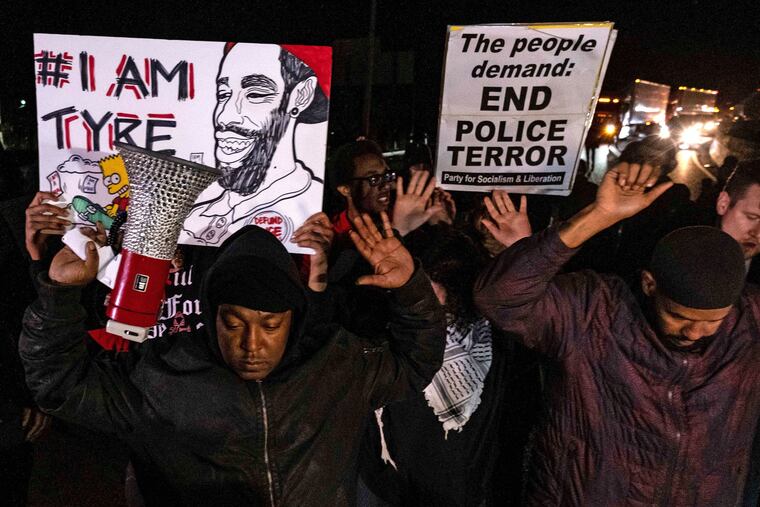Memphis to consider version of Philadelphia law that bans minor traffic stops in response to Tyre Nichols killing
A Memphis City Council member is pushing for the city to adopt a law banning traffic stops for some low-level violations to reduce police interactions with residents.

A Philadelphia law that bars police from pulling over drivers for some minor traffic offenses has inspired a similar bill in Memphis, Tenn., where five police officers are facing murder charges for the January death of Tyre Nichols.
The Memphis legislation is being championed by council member Michalyn Easter-Thomas, who introduced the plan in the aftermath of Nichols’ death on Jan. 10. Police pulled over Nichols, 29, who was Black, for an alleged traffic violation, and then brutally beat him. He died three days later.
Philadelphia in late 2021 became the first big city in the country to pass a “Driving Equality” law, which reclassified seven low-level offenses as “secondary,” meaning they can’t serve as the sole reason a police officer pulls over a motorist. The law, which was designed to cut down on racial disparities in car stops, took effect in early 2022.
Easter-Thomas appeared Monday during a virtual news conference with Philadelphia City Councilmember Isaiah Thomas (no relation), who authored the Philadelphia bill. She said that she was inspired by the legislation and that the Memphis version bans stops for six minor offenses.
“We want to decrease the possibility of negative interactions,” she said. The bill was supported unanimously by Memphis Council members on its first reading and must be voted on two more times to be passed, which Easter-Thomas said could happen by early March.
It’s unclear why Nichols was pulled over. Police initially said he was stopped for driving recklessly, but they later said there was no evidence to suggest he’d done so. Reckless driving is not one of the offenses included in the driving equality legislation.
Under Philadelphia’s law, the violations that are now classified as secondary include having a single headlight out, driving with a registration that has been expired for less than 60 days, or operating a vehicle with an expired inspection sticker. Officers can still mail citations to drivers over the violations.
» READ MORE: Driving equality, explained: These are the violations that no longer warrant a police stop in Philly
Proponents said the goal was to decrease the number of pretextual stops, which police departments have at times used as a means of pulling over drivers they suspect of carrying illegal drugs or firearms. The practice, according to critics, has long been used to unfairly target Black drivers.
But Philadelphia police data show the number of traffic stops has not notably dropped since the law took effect, though vehicle and pedestrian stops had previously been plummeting for several years.
For example, in January, Philadelphia police made about 10,850 vehicle stops compared to about 8,500 in January 2022 before the law took effect. Vehicle stops had dropped to below 1,000 per month during the height of the pandemic, compared to more than 33,000 in January 2019.
Thomas said he isn’t surprised there are month-by-month variations. He said there are limitations to the available data and that he’s working with the Police Department to collect aggregate figures for a report that he expects to be released next month.
“That’s honestly an area where we haven’t seen a sense of urgency,” he said, “as it relates to purchasing the technology that we need to be able to get that data communicated to us.”
Thomas, who is Black, said the legislation that’s now a model for Memphis is “near and dear to my heart.”
“I know personally what it’s like to be profiled, to be stereotyped, to be pulled over,” he said. “Hopefully we can put the next generation of young people in a position where their first interaction and their introduction to law enforcement is not necessarily one that started with a traffic stop.”
Philadelphia’s version of the legislation has not been without controversy. The police union sued to try to overturn it, and Republicans in Harrisburg have floated legislation that forces cities to choose between safer bike lanes and driving equality laws.
Last summer, the Pennsylvania Law Enforcement Accreditation Commission signaled that the Philadelphia Police Department could lose its accreditation over the law and a companion executive order, but the group backed away from that and the department retained its status as accredited.
And in Pittsburgh, which passed a similar ordinance in late 2021, police last month said they would resume making low-level traffic stops in defiance of the city law.